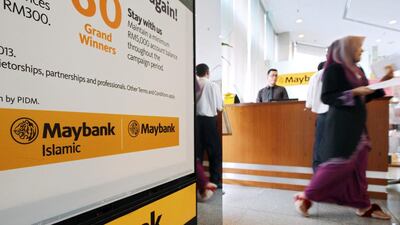London has been riding a wave of Islamic investment in the past few years and is keen to attract more dollars from the fast-growing economies in Asia and the Middle East.
The idea for hosting the first World Islamic Economic Forum (WIEF) outside Asia in London goes back to the late Sir Simon Milton, a Conservative politician who was one of the London mayor Boris Johnson’s advisors.
London officials approached the WIEF organisation’s leaders who were keen to turn the forum into a genuinely global event where Muslims and non-Muslims could meet to talk business and economics.
“We staunchly believe that when people get together for business, they forget their political, religious and ideological differences because there is one compelling commonality that matters most before them – and that is the impetus to be peaceful and prosperous,” says Tun Musa Hitam, the chairman of the WIEF Foundation.
David Slater, the director of international business development at London & Partners, which works to promote the capital, says the forum will attract big players. “We have always promoted London as the city where people from across the world are welcome to come and do business. This is a major event and will see the largest number of heads of state here since we hosted the G20 in 2009.”
The 9th WIEF begins in London’s Docklands exhibition centre on Tuesday, under the banner “Changing World, New Relationships”.
Businesses attending the event will include PricewaterhouseCoopers, Coca-Cola, Thomson Reuters and the Battersea Power Station Development Company.
The Prince of Wales will speak at the events’ gala dinner, addressing the summit’s many dignitaries, which will include 19 heads of state and five central bank governors. The British prime minister is also expected to address the event.
Mr Johnson, just back from courting Chinese investment, will certainly be present and is likely to be noisy in his vigorous promotion of his city to the visitors.
“We are bringing people together to talk about economic and business issues,” Mr Slater says.
At last year’s forum, deals worth an estimated £5.8 billion (Dh20.43bn) were struck and it is expected more will be announced at this year’s conference.
“There are deals in the pipeline, that have been in discussion for a long time, which we hope will be announced next week, many of which will be of benefit to London and the UK,” Mr Slater says.
In the past few days it has emerged the sovereign wealth funds of Qatar and Kuwait could invest in the United Kingdom’s first new nuclear power station in a generation. That is the sort of deal the British government would love to cement at WIEF.
The conference will also be an opportunity for British small and medium-sized businesses to promote themselves to Asian and Islamic markets through the British Business Pavilion, which is being sponsored by UK trade and investment, an arm of the British government that aims to help UK firms to export.
“It is an immense honour that the World Islamic Economic Forum has chosen London for its first gathering outside of Asia,” says Mr Johnson.
“Hosting this prestigious conference presents huge opportunities to promote London as a world beating business hub, highlighting our status as a major centre of Islamic finance and as a compelling destination for foreign investors.”
The global Islamic finance sector is estimated to be worth US$1.46 trillion last year and could top $2tn by 2015.
According to the latest figures, the UK benefited from a globally buoyant sukuk market in recent years, with issuance up two thirds last year to $139bn
Britain has the largest Islamic banking sector outside the Middle East and Asia, with 22 Sharia-compliant banks or banks with Islamic windows.
“Considerable potential exists for expansion of the Islamic finance industry worldwide,” says Chris Cummings, the chief executive of TheCityUK, which promotes the financial services industry in London.
“We look forward to continuing our work with government to encourage inward investment via Islamic finance and to extend the UK’s advantage as the leading western hub for Islamic finance,” he adds.
Islamic finance has been used to build the capital’s Shard, western Europe’s tallest tower and which is owned by Qatar. The redevelopment of Battersea Power Station is being funded by Malaysian investors. Malaysia is now the second-largest property investor in London, after the United States.
Rob Tincknell, chief executive of Battersea Power Station Development Company, says he is excited about being involved in what he anticipates will be a “fantastic” event.
“The redevelopment of Battersea is one of the most important real estate projects in the world. It’s long-term success will be internationally based, whether that is the international businesses or retailers who want to take space here or the international banks who want to lend us money,” he says.
“The WIEF is a great opportunity for us to push awareness of our project in the widest circles.”
Recent census data shows that 12 per cent of London’s population is now Muslim, compared with 4.8 per cent of the total UK population.
For the Islamic population in the capital, the presence of a high-profile Islamic event underlines the diversity of the city in which they live.
Islamic finance is not just another financial service to be offered by the City. It represents real jobs and real funding to businesses large and small, both in London and the wider UK economy.
Those attending the WIEF should find London a very welcoming host city.
business@thenational.ae

